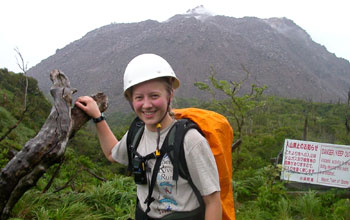|

Press Release 04-083
150 U.S. Graduate Students Embark on Research Experiences in East Asia and Australia

June 18, 2004
American students are happy to find jobs during the summer to help pay for their schooling. Others are more fortunate to be part of intern programs that prepare them for their eventual professional lives. For some others, however, the summer prospects are even more rewarding. How about an opportunity to construct carbon nanotubes in a Sydney, Australia laboratory? What about the chance to study with a molecular virologist in Taipei to search for a potential HIV cure? Or maybe do research based on a fossil fuel carbon emission model created in Seoul to better understand the effects of greenhouse gases?
The National Science Foundation's (NSF) 2004 East Asia and Pacific Summer Institutes Program (EAPSI) for U.S. Graduate Students will offer just such opportunities for 150 advanced science and engineering students this summer in Australia, China, Japan, Korea, and Taiwan. NSF will support these students as they conduct research with foreign counterparts in fields such as cancer research, humanoid robotics, computational neuroscience and nanofabrication.
For example, Matthew Averill, a graduate student at the University of Texas at El Paso, will work on earthquake prediction with researchers at the University of Tokyo. Sarah Rothenberg from the University of California, Los Angeles, will work on modeling urban water demand at China’s Institute of Geographical Sciences and Natural Resources.
"This is the largest contingent of U.S. graduate student participants in the program's 14-year history," according to Larry Weber, who manages the EAPSI program. "These research experiences abroad offer exciting discovery opportunities for talented American science and engineering graduate students, and the program will enable them to have the skills necessary to operate in a competitive international research arena and global marketplace in the future."
The institutes provide U.S. graduate students in science and engineering with first-hand research experiences in Australia, China, Japan, Korea or Taiwan, as well as an introduction to the culture and language of the region. The institutes also offer students first-hand knowledge of the research infrastructure and science policies of their international partners.
The summer institutes last approximately eight weeks from June to August. Each EAPSI awardee receives from NSF an international round-trip air ticket and a stipend of $3,000. Sponsoring organizations in these East Asia and the Pacific communities support students' local living expenses.
NSF administers and manages the EAPSI program through its Office of International Science and Engineering. The National Institutes of Health (NIH) co-sponsor the summer institute in Japan.
Applications are being sought for the 2005 summer institutes. The deadline for submitting those applications is Dec. 10, 2004.
-NSF-
For a complete list of 2004 EAPSI awardees and research areas, see: http://www.nsf.gov/pubsys/ods/getpub.cfm?eapsi04
For general program information, see: http://www.nsf.gov/pubsys/ods/getpub.cfm?nsf03608
For more information on application requirements for 2005, see: www.nsftokyo.org/spmenu.htm

Media Contacts
Bill Noxon, NSF (703) 292-7750 wnoxon@nsf.gov
Program Contacts
Anthony Teolis, NSF (703) 292-7343 ateolis@nsf.gov

The National Science Foundation (NSF) is an independent federal agency that supports fundamental research and education across all fields of science and engineering. In fiscal year (FY) 2009, its budget is $9.5 billion, which includes $3.0 billion provided through the American Recovery and Reinvestment Act. NSF funds reach all 50 states through grants to over 1,900 universities and institutions. Each year, NSF receives about 44,400 competitive requests for funding, and makes over 11,500 new funding awards. NSF also awards over $400 million in professional and service contracts yearly.
 Get News Updates by Email Get News Updates by Email
Useful NSF Web Sites:
NSF Home Page: http://www.nsf.gov
NSF News: http://www.nsf.gov/news/
For the News Media: http://www.nsf.gov/news/newsroom.jsp
Science and Engineering Statistics: http://www.nsf.gov/statistics/
Awards Searches: http://www.nsf.gov/awardsearch/
| 


